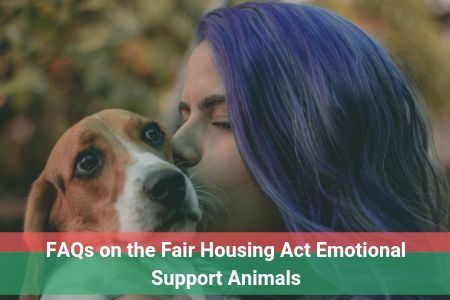The Fair Housing Act
The Fair Housing Act is a similar federal law and in place in both Canada and the United States. It prohibits discrimination during the sale or the renting of housing. It is against the law to discriminate based on race, color, religion, sex, culture, disability, or family status. People with disabilities, as outlined by the Act, are allowed reasonable accommodation. This includes a requirement of Emotional Support Animals.
An individual cannot be denied housing based on a disability or animal that is required as support. In the US, the Department of Housing and Urban Development (HUD) is the agency that watches over the Fair Housing Act and will look into any claims of discrimination in the area of housing. They will assess if the person who uses the support animal has a diagnosed disability, and does their animal offer a service to that person for their well being.
Answering yes to both these criteria means no one can discriminate against a person for having an animal. They must be offered housing without restrictions such as "pet deposits", or no pet clauses. Disabled people should have equal opportunity to have a home that is the same a non-disabled people.
An emotional support animal is one that assists a person with a disability. They are a companion animal that gives therapeutic support to a person with a mental or psychiatric disorder. These animals are classified in the United States under the federal Fair Housing Act. And, although they offer the affection of a pet, they are present in the handler’s life to make their life easier and more accessible. They can help with:

A service dog, as well as other service animals, is trained to do things for individuals who are disabled. Their work is directly linked to their person’s disability.
An emotional support animal offers a therapeutic benefit by being a companion, offering emotional support and comfort to those who have psychiatric disabilities and other mental illness. Support animals are not trained to do tasks but to give support. They are covered under the FHA, protecting their status and ability to be supportive.
While therapy dogs can have additional training to help people with post-traumatic stress or anxiety, without a certification they will not be considered service dogs. Similarly, while the tasks performed by emotional support dogs might be essential for their owner, they don’t reach the legal mark needed for service dogs and other service animals.
No, they do not. They do not need to be trained or certified. However, they are required to help a disabled person function so they will need to be able to do that whether its through training or simply having natural skills.
Depending of the needs of the owner, emotional support dogs can be trained to recognize and assist when they sense anxiety or stress. These dogs are not solely companion animals as they are crucial for their human’s health.
The Fair Housing Act applies to all housing for sale or rent. The only exemptions are smaller units, homes sold by the owner without an agent and some places with a small tenancy. In these cases the housing provider might deny accommodation due to the animal.
Generally, homes that may be excluded from the act would not be suitable accommodation for dogs in the first place. But, those with smaller comfort animals or service animals may still reach an agreement with the landlord about keeping them inside.
If an individual needs an emotional support animal, they must talk to their landlord. They need to offer documentation of their disability and need for a support animal. They should make a request in writing describing why they need a support animal.
It is not required a person to disclose what their health issue is, but they do have to have professional input as proof. Whether it comes from their doctor, psychiatrist, or therapist, confirmation of difficulties is required. This will verify the need for an emotional support animal.
No. Your landlord may ask for proof that you have a disability but not what it specifically is. They don’t get to know the medical details. They simply need proof that the requirement for unemotional support dog is real.

No. Your animal is a support dog, so you can go in all areas of your living facility that you can enter. There may be some restrictions around common areas such as party rooms, but generally, your support animal will be allowed in most places.
No. There are no limitations applied to which animal is your support. A landlord may only inquire about the necessity of the animal and whether it threatens the safety of others. It can't be based on assumptions or past experiences with other animals. A breed cannot be labeled dangerous. However, if a landlord’s insurer has a policy banning specific breeds or animals, then this may have to be upheld as it would cause undue problems for the owner. This would have to be proven by the insurer.
No. You can not be charged a “pet fee”. They are not considered pets but are working animals. They are not allowed to ask you to pay any deposits as it goes against the Fair Housing Act.
If you are pressured to pay anything, you may file a complaint and contact several non-profit organizations, both those who protect the rights of animals as well as people with mental health issue, and you might be provided with free legal representation.
Yes. If it's past the normal wear, then you can be held responsible. Beyond being legally obligated to clean up after your animal and maintain your home, you should also be a considerate neighbor. You need to care for your animal and their surroundings and keep things clean with a spot cleaner They must be kept well and healthy. Your place must be sanitary for both you and your support animal. So pick up after your pup with bags and scoopers and keep your housing clean.
If you think you need more than one, then you need to prove that to your landlord. You would need the same documentation for each animal that you did with just one. Each animal would need to help with a different symptom of the disability.
In most cases, yes as they are support animals in a place where their owners live.
Final Thoughts
Many questions around the Fair Housing Act and emotional support animals are simply answered. By making sure the animal behaves well and supports their handlers, means most of the requirements will be met. Being a good neighbor or tenant will make the use of an emotional support dog less problematic with homeowners.









